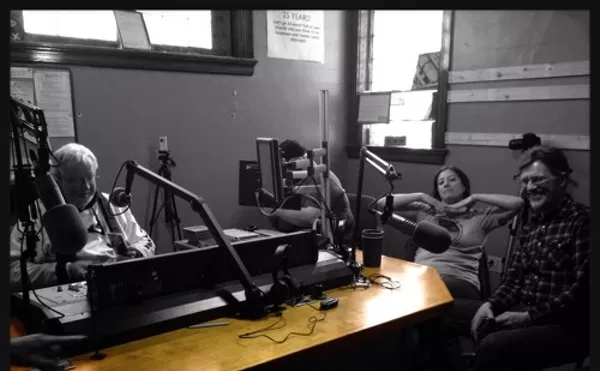50. The Urge - "Going to the Liquor Store" (1992)
We'd be remiss to talk about the songs of St. Louis without mentioning one of its most beloved bands. The ska-and-funk-influenced alternative rockers have been polishing off brass-studded songs intermittently since the late '80s to widespread acclaim. This particular track gets rapping, singing and screaming frontman Steve Ewing pogoing onstage to a sweaty horde of devoted, lip-syncing fans like none other. Bonus: See if you can find the reference to it on the menu at Ewing's joint Steve's Hot Dogs. (Hint: It involves a pickle.) A series of reunion shows over the years makes the group's message all the more clear: The party's not over yet -- not now, not ever. -Mabel Suen
49. Thomas Turpin - "St. Louis Rag" (1903)
You know the name Scott Joplin, and you can probably hum along to "The Entertainer." But make some room in your ragtime heart for Thomas Turpin, the author of "Harlem Rag," the first such tune published by an African American. (That would be 1897 for those keeping score.) Turpin played piano in Babe Connor's Castle, a legendarily sinful "entertainment house" on Sixth Street, and ran his own joints (notably the Rosebud at 2220 Market Street) where some of the major black pianists of the day would gather. Turpin was not prolific, but his "St. Louis Rag," written (like so many other tunes of the time) to capitalize on the Lewis and Clark Expo, captures the bawdy and auspicious spirit of a new age. It still sounds like anything goes. -RK
48. The O'Neal Twins - "Jesus Dropped the Charges" (1981)
In the history of gospel in our town, few names cast a bigger shadow than Edgar and Edward O'Neal. As men of great girth and even greater vocal force, the twin brothers began their recording career in the 1960s, cutting several singles for Peacock (1966's "I'll Trade a Lifetime" gave them their first real exposure), and in the '70s the O'Neals worked with Leon Russell and his Shelter Records. But it's the powerhouse track "Jesus Dropped the Charges," a nonstop stunner of confessed guilt and professed salvation that shows the O'Neals at the peak of their power. Edgar mans the piano while Edward leads the choir -- and eventually the congregation -- to the mountaintop where they are emphatically "saved by grace!" Whether or not you've found religion, you can't deny the spirit that inhabits this performance, especially as heard on the live-in-St. Louis Saved By His Love LP and on the gospel documentary Say Amen, Somebody. -CS
47. Bits N Pieces - "The City Is Us" (2000)
The story of Bits N Pieces shouldn't have ended with Katt Davis' untimely death, but songs like "The City Is Us" ensured the hip-hop duo's legend would outlast its lifespan. Over a mid-tempo DJ Crucial beat built around a minor-key piano loop, brothers Katt and Jia Davis chronicle the various people they encounter every day in the city. Katt's standout verse uses his daily commute to connect his miniature character studies. He relates to some people in painful ways: "Some bum he asked me for change, which had me laughing in vain, 'cause I'm just as broke as him without the smell and clothes." Bits N Pieces are talking about St. Louis, but they emphasize that all cities are composed of people who internalize this life and carry it with them wherever they go. -BM
46. Bunnygrunt - "S. Kingshighway Bubblegum Factory" (2009)
The south side of Kingshighway is not the most romantic stretch of street in town - in fact, dotted with fast-food restaurants and big-box retailers, it might be one of the ugliest stretches of road around. Turning the concrete and asphalt wasteland into the tasty treat of "S. Kingshighway Bubblegum Factory" is a feat only Bunnygrunt, expert practitioners of bubblegum punk, could manage. The grand total of three lines of lyrics make this official mating call of the south side easy to sing along to: "Knew that I could love you when you drove me down the street just the other day / knew that I could love you when you took me to the place that the lovers play / South Kingshighway Bubblegum Factory!" -JD
45. Chris Johnson - "Down in Lemay" (2005)
With nothing more than plaintive guitar plucks and a harmonica that's as soulful as it is mournful, Chris Piedmont Johnson take a tour from the edges of south St. Louis, where the dregs of south sity merge with the dregs of south St. Louis County. Zeke's Bar on Meramec gets memorialized (you may know it better as the Time Out Sports Bar & Grill), and the sad, dirty River Des Peres' metaphorical weight will be obvious to anyone who has caught a whiff of its foulness. But Johnson holds no bitterness for his roots as he lingers over faded yearbook photos and fading memories. "Life's fragile," he sings, "and I'm almost certain that it was designed that way." Sitting on the shores of the River Des Peres, it's hard to feel any other way. -CS
44. Clark Terry - "Swahili" (1955)
Renowned trumpet player Clark Terry's more than 70-year-long musical career began in the jazz clubs of early '40s St. Louis, but it wasn't until Terry released his self-titled debut as a bandleader in 1955 (also released alternatively as Introducing Clark Terry and Swahili) that Terry was recognized nationally as a figure at the forefront of jazz trumpet. The album's opener, "Swahili," demonstrates Terry's distinctive combination of the "clear, singing tone" (as jazz historian Dennis Owsley puts it) associated with St. Louis' early jazz trumpet players like R.Q. Dickerson and Charlie Creath, and the literate, sophisticated musical language of bebop. -NH
43. Otis Spann - "Down on Sarah Street" (1966)
Born in Jackson, Mississippi, Otis Spann made his name in Chicago, though, as this song makes plain, he had a soft spot for this river city. Recorded live in the studio with an audience invited in just to urge him on, Spann borrows some players from Muddy Waters' band -- including Sammy Lawhorn, Luther Johnson, Mac Arnold, George "Harmonica" Smith and Francis Clay -- and checks in on "a great old friend of mine" down on Sarah Street. Spann lets Smith and Clay do the driving, but his piano fills are the sound of a man who wants to lose the blues and hold on to them all at once. -RK
42. Skip Battin - "St. Louis Browns" (1972)
The St. Louis Cardinals are so tied to our city that it's easy to forget St. Louis once had a second baseball team. Skip Battin remembers. In 1972, toward the end of his tenure with the Byrds, the journeyman country-rock bassist cut a novelty tune about what essentially was a novelty team. Over down-home piano, funky drumming and ever-present twangy lead guitar, Battin recounts the history of the franchise that "lost more than the Mets could ever dream." Battin gets some of the details wrong -- stunt batter Eddie Gaedel stood all of three feet and seven inches, not "about four foot eleven" -- but he captures the spirit of the hapless team that had just enough going for it to be rebranded as the successful Baltimore Orioles in 1954. -BM
41. All Stars - "All City" (2005)
Standing in stark contrast to the lighthearted party rap of St. Louis' most recognizable hip-hop exports like Chingy, Nelly and Sylk Smoov, All Stars' hard-hitting, socially conscious track "All City" -- which opens the 2005 album of the same name -- showcases St. Louis' darker side, opening with the line "Welcome to All City, where it's not at all pretty." The track's abrasive drum sounds and gloomy synth-strings set the stage for Trust, Top Dolla, Nimmy Russell and Vic Damone to ruminate on "Missouri's misery," resulting in a picture of St. Louis decidedly different than the urban glorification of Nelly's "St. Louie." -NH





